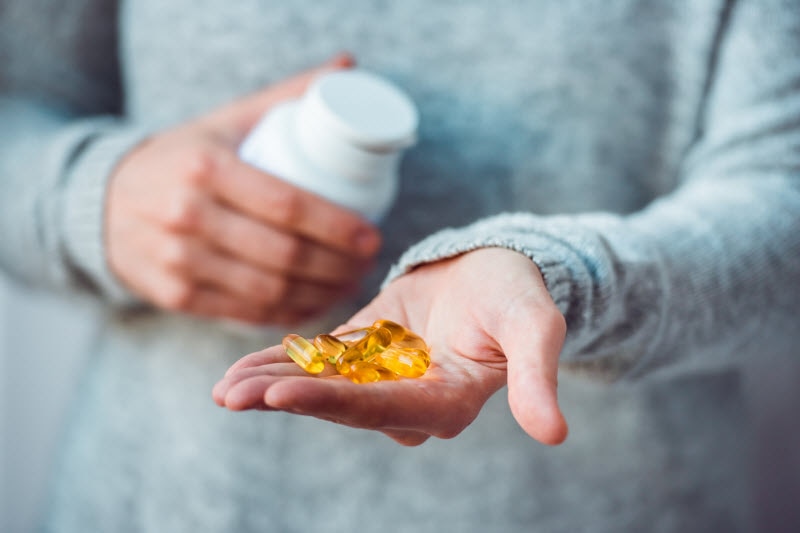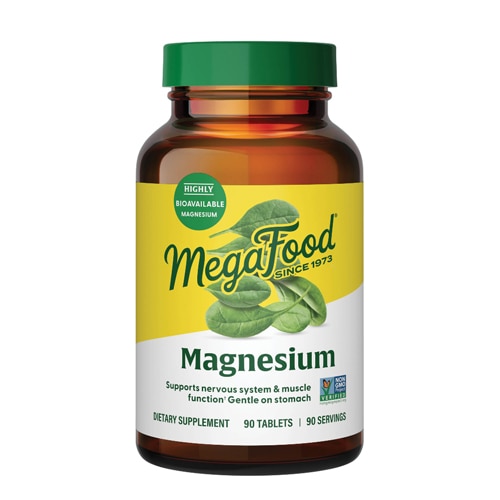By now you know age, gender and other genetic factors can increase your risk of developing cardiovascular disease. Unfortunately, you can’t do much about your genetic makeup. What you
can control are your lifestyle choices, including if and what
supplements you might take. Below are five well-regarded nutrients that have proven to support a healthy heart.† So if you’re ready to make a positive change – and an easy one, at that – talk to your doctor about incorporating these supplements into your routine.

5 Heart Health Supplements Worth Trying
1. Omega-3s
Omega-3s are a type of polyunsaturated fatty acid (PUFA). Structurally speaking polyunsaturated fats have two or more double bonds. The distance between the first carbon chain and the first double bond is either three carbons or six, which is why the different PUFAs are referred to as omega-3 and omega-6. Polyunsaturated fats are also less saturated with hydrogen atoms, which is why they’re typically liquid at room temperature.
There are three main types of
omega-3 fatty acids you’ll want to know: eicosapentaenoic acid (EPA), docosahexaenoic acid (DHA) and alpha-linolenic acid (ALA). EPA and DHA are the most widely studied and well-understood of the omega-3s. Time and again, researchers have confirmed their cardioprotective properties.† These omegas are primarily found in fatty fish. ALA, on the other hand, is found in plant sources. ALA can be converted into EPA and DHA in the body, though the conversion amounts are quite small.
Who should take omega-3 supplements?
Omega-3s are
essential fatty acids, meaning your body cannot produce these fats on its own. You have to rely on food and supplements to meet your needs. The richest sources of omega-3s are fatty fish like salmon, mackerel and sardines.
Non-fish sources of EPA and DHA include vegetable oils, walnuts and flaxseed. If your diet lacks these foods, you may not be getting enough omega-3 fatty acids to support your health. A
fish oil supplement will offer the highest concentrations of omega-3s, particularly EPA and DHA. Speak to your doctor to find out what would be the best concentration for your body.
2. Coenzyme Q10 (CoQ10)
Coenzyme Q10 is part of the ubiquinone family of compounds. The name refers to how
ubiquitous these compounds are in the human body. In fact, CoQ10 is a fat-soluble compound found in almost all cells, specifically the inner mitochondrial membrane. Cells use CoQ10 to convert carbohydrates and fats into ATP, the body’s main source of energy.
CoQ10 is also known for its antioxidant properties. In its reduced form, CoQ10 can effectively protect cell membranes and lipoproteins from oxidation. By neutralizing free radicals, it helps maintain the integrity of your cells.†
What does all this have to do with heart health?
The heart is a primary energy producer with lots of hard-working mitochondria. The heart has a particularly high concentration of CoQ10. When plasma levels of CoQ10 are low, heart health could be at risk. A
study of 1,191 heart failure patients proved that a low concentration was indicative of advanced heart disease. The good news is
a recent meta-analysis found that giving heart failure patients a daily CoQ10 supplement resulted in a 39% reduction in mortality and improved exercise capacity.†
Who should take CoQ10 supplements?
Even if you haven’t experienced heart failure, a CoQ10 supplement may be beneficial. Concentrations of CoQ10 in your tissues decline with age. These levels can be further taxed by taking cholesterol-lowering medications, such as statins. To get the full range of benefits, look for a CoQ10 supplement with black pepper extract. The black pepper enhances absorption.
3. Magnesium
Magnesium is an essential mineral. Your body contains about
25 grams of total magnesium and doesn’t make any more on its own. You have to get what you need from food and supplements – and it’s important that you do. Magnesium participates in more than 300 chemical reactions all throughout the body. These enzymatic reactions include those that regulate blood pressure and blood glucose, two important factors associated with cardiovascular health.
One of magnesium’s most important roles involves generating cellular energy (ATP). Intracellular magnesium activates the enzyme adenosine triphosphatase (ATPase), which then powers the sodium-potassium pump. The sodium-potassium pump is found in cell membranes and is essential for firing nerve impulse conduction, contracting muscles and regulating heart rhythm. A deficiency in magnesium can greatly affect any or all of these natural functions.
Who should take magnesium supplements?
Magnesium is an easy-to-find nutrient in food.
Chia seeds,
almonds, spinach, peanuts, black beans and yogurt are just some of the many healthful sources of magnesium. However, a diet rich in magnesium may not be enough. Taking certain medications, such as antibiotics, diuretics and proton-pump inhibitors, can cause magnesium loss. And, unfortunately, serum magnesium only accounts for about 1% of total magnesium. So a simple blood test may not offer an accurate reading. Ask your doctor about testing your nutrient levels and consider supplementing if you have any concerns. Before picking your pill, brush up on the different
types of magnesium supplements. Certain forms of magnesium – in certain amounts – can have a laxative effect.
Magnesium glycinate tends to be the most tolerable, but each type has its own unique benefits.
4. Red Yeast Rice
Red yeast rice is white rice that has been fermented. It turns bright reddish purple due to the yeast that grows on it,
Monascus purpureus. Red yeast rice is a staple in Asian cuisine. It is sometimes ground up and used as food coloring for fish, beverages and cheese. Of course, some red yeast rice is used to make dietary supplements.
Red yeast rice contains a substance known as monacolins. Monacolin K, in particular, has the same chemical structure as a popular cholesterol-lowering prescription drug (Mevacor). That said, research has yet to conclude whether the health properties of red yeast rice are due to monacolin K or because this fermented rice also offers essential fatty acids, isoflavones and plant phytosterols. In any case, red yeast rice has long been used in traditional Chinese medicine as a means to support heart health.
Who should take red yeast rice supplements?
Red yeast rice supplements supply heart-healthy nutrients for any adult.† Studies that have been done on red yeast rice have used a standardized extract of 600 mg. Just be mindful of potential interactions. Anyone taking cholesterol-lowering prescription drugs, statins or blood thinners should talk to their doctor first. Also note, red yeast rice can lower CoQ10 levels. But adding a CoQ10 supplement makes for the perfect complement.
5. Hawthorn
Another important part of traditional Chinese medicine is the hawthorn berry. This tiny fruit grows on trees and shrubs of the rose family. The hawthorn plant is botanically known as
Crataegus laevigata. It is also called English hawthorn, woodland hawthorn or mayflower. In traditional Chinese medicine, the berries (
Crataegus pinnatifida) are used to support healthy cholesterol, blood circulation and inflammation, to name a few.† That said, the leaves and flowers can also be used; and they are believed to supply more flavonoids than the berries. Flavonoids are plant compounds that offer antioxidant effects.
Who should take hawthorn supplements?
Hawthorn supplements are safe for adults. Like any supplement, talk to your doctor first, especially if your healthcare provider has already prescribed heart medications. When selecting your supplement, look for a
standardized hawthorn extract. This ensures you’re getting the beneficial flavonoids.
While heart health supplements cannot diagnose, treat, cure or prevent disease, they may offer far-reaching benefits. These five nutrients, among others, are well-studied and widely used. If you’ve given any thought to your heart health, don’t waste another minute. Your heart is the hardest-working organ in the body. So, you’re never too young or too old to give your heart the love it deserves. Talk to your healthcare team and get started on a supplement routine today.
†These statements have not been approved by the Food and Drug Administration. These products are not intended to diagnose, treat, cure or prevent disease.




